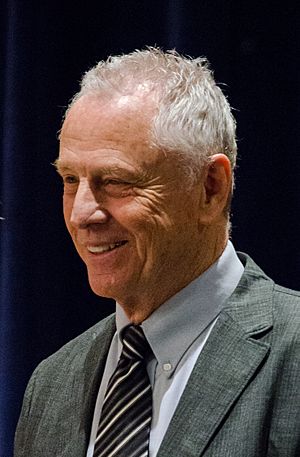Morris Dees facts for kids
Quick facts for kids
Morris Dees
|
|
|---|---|

Dees in 2015
|
|
| Born |
Morris Seligman Dees Jr.
December 16, 1936 Shorter, Alabama, U.S.
|
| Alma mater | University of Alabama (LLB) |
| Occupation | Civil and political rights, social justice activist |
| Known for | Founder of the Southern Poverty Law Center |
Morris Seligman Dees Jr. (born December 16, 1936) is an American lawyer famous for co-founding the Southern Poverty Law Center (SPLC). The SPLC is an organization that fights for the rights of people who are treated unfairly.
Before becoming a famous lawyer, Dees ran a successful direct marketing company. This means he sold products directly to people through mail and ads. In 1971, he used the money he earned to start the SPLC with his law partner, Joseph J. Levin Jr.
Dees and the SPLC became known for a smart legal strategy. They sued hate groups, like the Ku Klux Klan, for large amounts of money. This often forced the groups to shut down because they couldn't afford to pay. In March 2019, the SPLC announced that Dees was no longer working for the organization.
Contents
Early Life and Career
Morris Dees was born in 1936 in Shorter, Alabama. His parents were cotton farmers. After graduating with high honors from the University of Alabama School of Law in 1960, he started his own law office in Montgomery, Alabama.
Before focusing on civil rights, Dees was a very successful businessman. He started a direct mail marketing company with a partner, Millard Fuller. Dees later bought his partner's share of the business. In 1969, he sold the company for a lot of money.
Even though new laws had been passed to protect people's rights, Dees knew that many groups still treated minorities unfairly. He decided to use his money to fight for justice. This led him to create the Southern Poverty Law Center.
Fighting for Civil Rights
Dees became a powerful force in the fight for civil and political rights. He used the law to challenge groups that promoted hate and discrimination.
The YMCA Case
In 1969, Dees took on an important case against the Young Men's Christian Association (YMCA) in Montgomery. A civil rights activist named Mary Louise Smith asked for his help. Her son and nephew were not allowed to join a YMCA summer camp because they were African-American.
At the time, the YMCA was a private club, so it didn't have to follow the Civil Rights Act of 1964, which banned discrimination in public places. But Dees discovered a secret deal between the city of Montgomery and the YMCA. The city was letting the YMCA run its public parks to avoid letting African-Americans use them.
Dees proved in court that because of this deal, the YMCA had to follow the same rules as the city. The court agreed and ordered the YMCA to stop discriminating. This victory encouraged Dees and showed him how the law could be used to make big changes.
A New Way to Fight Hate Groups
Dees helped create a new legal strategy to stop hate groups. Instead of just sending people to jail, he would sue the entire organization for the harmful actions of its members. If he won, the group would have to pay a large amount of money, called damages.
This strategy was very effective. Often, the hate groups would go bankrupt trying to pay the damages. This would force them to close down for good.
Famous Cases
- United Klans of America (UKA): In 1987, Dees and the SPLC won a $7 million lawsuit against the UKA. The case was on behalf of Beulah Mae Donald, whose son, Michael, had been killed by UKA members. The huge payment bankrupted the UKA, and they had to sell their headquarters.
- White Aryan Resistance: In 1991, Dees won a $12 million judgment against this group and its leaders, Tom and John Metzger.
- Aryan Nations: In 2001, he helped win a $6.5 million judgment against this neo-Nazi group, which also led to it falling apart.
Dangers of the Job
Dees's work against hate groups was very dangerous. Because he was so successful at shutting them down, many of these groups targeted him. He received many death threats over the years. More than 30 people have been put in jail for plotting to harm him or attack the SPLC's office. This shows how much courage it took for Dees to continue his work.
Work in Politics
Besides his legal work, Dees was also involved in politics. He helped raise money for several presidential campaigns.
- In 1972, he was the financial director for George McGovern's campaign.
- In 1976, he was the national finance director for Jimmy Carter's successful campaign.
- In 1980, he was the finance chairman for Edward Kennedy's campaign.
Awards and Recognition
Dees has received many awards for his work fighting for justice and human rights.
- The American Bar Association gave him the ABA Medal in 2012, which is its highest honor.
- In 2016, he received the Martin Luther King Jr. Nonviolent Peace Prize from the King Center for Nonviolent Social Change.
- He has given speeches at many universities about civil rights and justice.
- The My Hero Project named him a Freedom Hero.
In Movies and TV
Dees's life and work have been shown in movies and on television.
- A TV movie called Line of Fire: The Morris Dees Story (1991) tells the story of his legal battles against white supremacist groups.
- His work was also featured on a National Geographic show in 2008.
 | Delilah Pierce |
 | Gordon Parks |
 | Augusta Savage |
 | Charles Ethan Porter |

